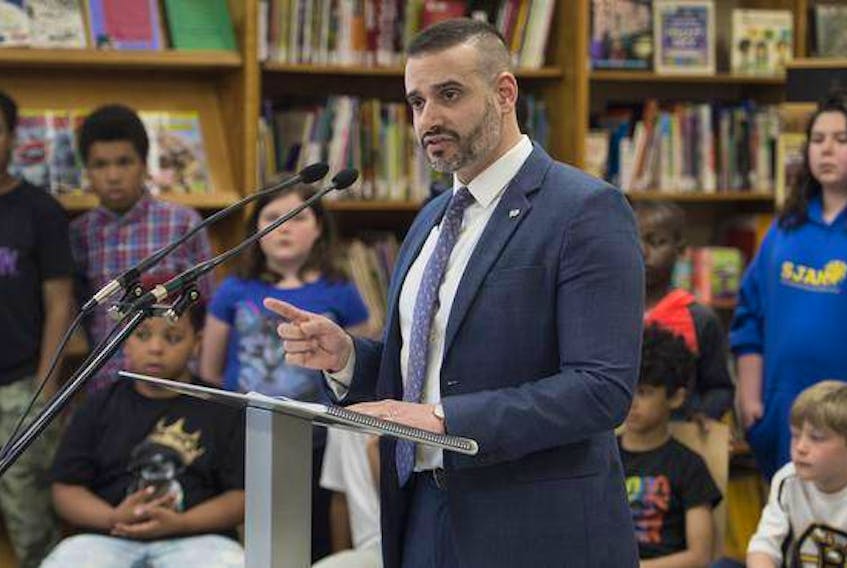HALIFAX, N.S. – Nova Scotia unveiled a $15-million plan for inclusive education on May 8 that Education Minister Zach Churchill outlined the province’s strategy that will see the hiring of more than 190 people.
But Churchill also noted the plans are ‘just a start.’
The move by the province follows the Students First report from the Commission of Inclusive Education, which was released in March after a year of intensive consultation on student and classroom needs with behaviour and autism supports.
The province’s strategy targets the hiring of 100 student and class support workers, including 60 education assistants to work in classrooms and 40 childcare practitioners to help design and carry out programs for those who have difficulty coping in school settings.
Seventy specialist teachers, including behaviour support teachers, autism specialists, learning-centre teachers, program-planning specialists and resource teachers, will also be hired.
There will be 11 “parent navigators” to help parents understand and find their way through the support systems available.
Six jobs are available for psychologists and speech pathologists and four student-health partnership nurses will be hired.
The new positions announced May 8 will be allocated on a needs basis across the province, he said. And the goal is to fill all the jobs by September.
“There’s obviously always a challenge when it comes to staffing, so we do have to work very hard to get these people in place for September,” the minister said. “We do think this is achievable but it’s going to take a lot of work.”
The jobs will be posted on Wednesday, May 9. Churchill acknowledges the plan is an ambitious one by the province but he's confident the hires will be in place for the start of the next school year in the fall.
There’s also funding in the province’s strategy for alternative education programs, Achieve programs, behaviour analysis, professional development, assistive technology, assessment resources and more.
“Behavioural supports have been what people identified as being lacking right now,” Churchill said. “That’s created some of the greatest pressures, I think, and challenges for our classrooms. So the focus on behavioural supports and autism supports are a key, primary focus for us getting into next year because that seems to be where a lot of the pressure is.”
Churchill said the department is looking at a three-year time frame in terms of executing all the recommendations from the report.
“It’s not the end of the story, either,” Churchill said.
“It’s the beginning of the supports that are going to be coming into play, so this is phase one. I will be working with my colleagues to make sure we have additional supports put in place year after year," said Churchill.
The strategy put forward by the province is not exactly what the report released in March recommends. One of the things not in the final plan is the creation of an “institute” to manage assessment of the program. Churchill said that would be too expensive. The education department instead will hire an independent third-party researcher to handle that evaluation process on a three-year contract with an option to renew. That person or team would give yearly public reports on the department’s performance.
The department is also partnering with Inclusive Education Canada to help with the oversight and implementation of the recommendations.
Churchill also stressed the importance of professional development.
“Two-thirds of our teachers told us through the commission’s consultation that they did not feel adequately prepared to tackle the complexities in the classroom,” he said. “So that is where we had been failing our professionals and we’ve got to do a better job of filling that gap in terms of training and learning.”
Dr. Sarah Shea, chairwoman of the Commission on Inclusive Education and a pediatrician at the IWK, said the announcement was exciting and she was happy to see a plan follow soon after the report was delivered, even if it is not exactly what was recommended.
“There’s nothing that’s been decided that I have a problem with. Ask 10 people to make chili, you get 10 different recipes. I think the recipe is a good one. It’s a start. I think that’s really important that this is an ongoing project. There are parts that will need some time to be accomplished.”
Tim Halman, education critic for the provincial Progressive Conservatives, said the plan is “a good first start.”
“I taught in the classroom for 13 years and the inclusion model was never funded properly, so this has been decades in the making since inclusion was brought to Nova Scotia,” he said.
He was concerned about the potential to create more bureaucracy.
NDP education critic Claudia Chender also lauded the investment in inclusive education.
“I think it’s a long time coming and I think our students have been waiting a long time,” she said, adding that she would have liked to see a five-year plan instead of only one year.
Halman and Chender both wondered if the jobs can be filled by September, calling the timeline “ambitious.”
Liette Doucet, president of the Nova Scotia Teachers Union, welcomed the “first step” toward a properly supported inclusive education model but questioned the decision not to create an institute of inclusive education.
“As we’ve witnessed in recent years, this government is better at making commitments than delivering on them,” Doucet said in a statement. “The institute would help bring transparency and accountability to this process, which would help rebuild trust between stakeholders.”
(Saltwire Network/Chronicle Herald)
OTHER TEACHER ANNOUNCEMENT: COUNCIL TO IMPROVE CLASSROOM CONDITIONS ANNOUNCES HIRING OF 57 TEACHERS
In an announcement that came on the same day that the province outlined its inclusive education strategy, the Council to Improve Classroom Conditions announced that high schools outside of the Halifax region are getting 57 more teachers.
The council is funding the hires. The group, which was set up in 2017 as part of the Liberal government’s imposition of a contract on the province’s teachers, has a budget of $20 million over two years to address concerns in the system. The cost for the 57 new high school teachers will be $5.2 million for the 2018-2019 school year.
Education Minister Zach Churchill was pleased with the announcement.
“Fifty-seven new teachers that will be allocated on a needs basis," he said. "So that could be for guidance counsellors, teachers to alleviate certain pressures in the classrooms, and we’re really excited to get these folks hired for next year so they can begin their important work.”
The new positions are in addition to, and separate from, the 190 jobs the department announced on May 8 as part of the province’s goal to institute some of the recommendations of the Students First report on inclusive education.
Churchill acknowledged there will be challenges to fill all the positions but he’s confident they will be able to do so.
“We think we’ll be able to meet these targets,” he said. “It’s going to take work. Our regional offices are going to be out recruiting and working very diligently over the summer to staff these positions.”
The new jobs follow a number of other initiatives the council continues to support, including an $8.9-million investment to maintain junior high and high school class caps, funding 40 teachers working on math and literacy in complex classrooms, funding 14 attendance support workers, and continuing the Inspiring Schools pilot project that provides grants to help students within complex classrooms with cost-sharing through the council and the Education Department.









